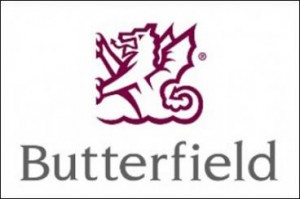Butterfield Bank Recovery Continues In Q3
 The Bank of N.T. Butterfield & Son Limited today [Oct.27] reported third quarter net income of $11.2 million –$0.01 per share on a fully diluted basis — compared to a net loss of $18.6 million in the third quarter of 2010 [$0.04 loss per share on a fully diluted basis].
The Bank of N.T. Butterfield & Son Limited today [Oct.27] reported third quarter net income of $11.2 million –$0.01 per share on a fully diluted basis — compared to a net loss of $18.6 million in the third quarter of 2010 [$0.04 loss per share on a fully diluted basis].
Year-to-date net income for the nine months ended 30 September 2011 was $31.4 million as compared to a year-to-date net loss of $194.8 million for the period ended 30 September 2010.
Cash earnings — before the amortisation of intangibles — during the period totalled $35.6 million compared to a loss of $190.5 million for the prior year. Year-to-date earnings per share totalled $0.03 on a fully diluted basis, versus a $0.47 year-to-date loss per share for the period ended 30 September 2010.
Bradford Kopp, Butterfield’s president and CEO, said, “The continuing progress across major profit drivers in our business: net interest margin, expense control and credit quality drives our results this quarter and underscores the progress the bank has made in turning its operations around in the wake of its recapitalisation.
“We have now delivered three straight quarters of profitability and our on-going initiatives give us comfort that both revenues and expenses will improve in the quarters to come.”
Mr. Kopp continued, “Credit quality has trended positively and we have significantly reduced exposures to continental Europe, with no direct sovereign debt and exposure to the banking sector limited to deposits or government-guaranteed notes. In addition to reduced risk, our balance sheet now boasts capital and liquidity ratios that are amongst the highest in the industry.”
Butterfield’s net interest margin improved to 2.46 percent in the third quarter of 2011, up from 2.02 percent during the like quarter a year ago; the increase derived principally from disciplined deposit pricing and allocation of investments to longer duration securities.
This improvement was offset by lower income on decreased transaction volumes and lower assets under management and administration.
Non-interest expenses of $73.9 million were down slightly versus the third quarter of 2010, despite a number of non-recurring items in Q3 2011. The efficiency ratio improved significantly to 82.3 percent from 92.1 percent at the end of Q3 2010.
Brad Rowse, Chief Financial Officer, said, “We have de-risked the balance sheet, instituted improved management of interest rate risk to improve net interest margin while staying with simple, lower risk investments, developed good lending opportunities and will soon implement our new core banking system in Bermuda.”
“With this strong progress, we are now well positioned to focus on our efficiency. We have made good progress, improving the efficiency ratio by nearly ten percent over last year. However, we have more work to do to manage our operating costs. In particular, we are focused on controlling expenses by refining processes and improving coordination of functional support across jurisdictional lines.”
“Our goal is to further improve our efficiency ratio to a level that is more consistent with industry standards while maintaining our dedication to risk management and a high level of customer service.”
Between 30 September 2010 and 30 September 2011, the Bank reduced headcount by 128 across all jurisdictions, leading to a net annualised reduction in salaries and benefits (net of provision for incentives and employment services) of $4.0 million [comparing the final month of the quarter to the year-ago period].
In early 2010, Butterfield suffered from large charges associated with its portfolio of structured securities. Consequently, a major restructuring took place including the issuance of $550 million of new equity and the sale of the bulk of the structured securities portfolio.
The recapitalisation was led by the Carlyle Group and the Canadian Imperial Bank of Commerce. Currently, CIBC and the Carlyle Group are the largest shareholders with ownership of 18.8 percent and 17.4 percent, respectively.
Post recapitalisation, key management changes were made including CEO, chief financial officer and chief risk officer combined with the addition of new board members with considerable banking expertise.


The only thing I want to hear from Mssrs. Kopp and Rowse is when our dividends will be re-instated? Dividends have been suspended far too long. Bet they did not suspend their staff bonus programme! We, as shareholders, are so complacent about these things. We will never have marches/ occupations as are occurring now on Wall Street.
BNTB will never every pay dividends on their common stock. You see, BNTB collapsed and now everything is different. In the not too distant future BNTB will be owned by CIBC. You will (if you don’t sell your BNTB stock) get CIBC stock for your BNTB stock. Then you will get dividends from CIBC. So hold tight (if you have the patience).
actually they did, and its costing them employees
They have a poor grasp of compensation practices. They need professional help.